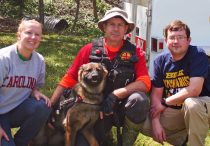
How Search & Rescue Training Protects Children With ASD
The Springbrook staff is committed to helping our community and keeping kids with autism safe. Elopement, or getting lost, is one of the primary safety concerns for children on the autism spectrum and their parents, which is why we recently hosted our second Search & Rescue Training Day—a collaborative effort between Springbrook and two other community organizations: SCSARDA and Vested Partners.
The Springbrook Campus is located in the foothills of the Blue Ridge Mountains, just outside of Greenville, SC and includes over 50 acres of woods, streams, ponds, and other interesting landscape, making it an ideal location for Search & Rescue Training. For this event, we also got permission to use the grounds of the adjacent YMCA; combined, the total training field was well over 100 acres.
The Training Day: How it Started and What We Do
In their spare time, many of our staff members volunteer with nonprofits and serve on the boards of organizations that benefit children with autism. Several years ago, Katy Snipes, our Director of Admissions, began volunteering with Vested Partners and talked us into taking on training for a therapy dog, Jesse. Eventually, Jesse was permanently placed with Dr. Fisher, and he has become a valuable resource for our students and a much-loved member of our treatment team.
Through our relationship with Vested Partners, we also got to know some of the highly-skilled volunteers at South Carolina Search and Rescue Dog Association (SCSARDA), an incredible organization that works in cooperation with local emergency response agencies to bring home lost and missing persons.
The idea behind the training is to to have volunteer children (and adults) who are affected by Autism and developmental disabilities to do more realistic trainings with the dogs and improve the dogs’ responses to high risk populations. Search & Rescue dogs need additional training when they are looking for children on the autism spectrum, who may be frightened of animals or not understand what’s happening, so the dogs have to modify their approach, stay calm, and keep the child calm. For training day, we ran the dogs through some fairly vigorous field trials using volunteers from our outpatient group and children and families from our staff and the community.
“In one training scenario, Shadow (one of the dogs) had to discriminate between three different scents,” said Dr. Fisher. “The child and his mom went one way while one of our staff members doubled back another way and pretended to be injured. Shadow totally found the kid despite all the distractions.”
During Training Day, we follow certain protocols to keep the kids safe. All participant groups are given a two-way radio or a cell phone, and children with ASD “get lost” with a participating parent. Also, the searches aren’t long: 15 minutes to an hour at most.
“The kids who participate love training day,” said Katy Snipes. “They get to spend a whole day out in the woods playing. It’s like a giant game of hide-and-seek. And the parents love it because it helps their kids stay safe.”
Overall, our second training day was a huge success—we trained four dogs and had six kids and their families participate! We also had one of the dogs (Shadow) come to Springbrook and do some demonstrations with the residential students. Shadow’s handler explained her job to a group of our kids and answered questions.
How Search & Rescue Training Protects Children With ASD
According to the National Autism Association, the mortality risk for the autism population is twice as high as the risk for the general population due, in part, to elopement and accidents while a child is wandering. Of course, prevention is always preferable, installing alarms and taking other home safety precautions against elopement is a must, but every parent should also be prepared for an elopement emergency.
In addition to training the dogs to know what to do when searching for a child on the spectrum, the training day also teaches the kids who participate how to behave when approached by a Search & Rescue dog.
“Parents really appreciate Training Day for what it does for their kids as much as what it does for the rescue dogs,” said Dr. Fisher. “The kids learn how a rescue dog behaves and know to stay still and let the dog approach. They’re also taught to stay in one place and wait after they’ve been found by a rescue dog. I know at least one of the parents who brought her child has had an experience with elopement before, and many parents who participate have had close calls. It’s every parent’s worst fear.”
Springbrook plans to continue hosting Search & Rescue Training days, and are currently looking at other locations throughout the Upstate. One potential location is over 170 acres and could accommodate some deeper woods Search & Rescue training.
If you would like to have your child participate in our next Training Day exercises, call us at (864) 843-8013 or contact us by email and ask to be notified before our next event.